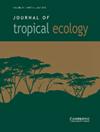Early successional habitat supports unique avian communities dominated by wintering migrants in a premontane tropical forest
IF 1
4区 环境科学与生态学
Q4 ECOLOGY
引用次数: 0
Abstract
Abstract Forest succession drives concomitant changes in associated faunal communities. Thus, maintaining landscapes with high successional diversity can be an important consideration in habitat management. We sought to describe avian community characteristics across a successional gradient created by reforestation efforts in a tropical premontane wet forest in Costa Rica. Specifically, we examined the effects of successional stage on overall abundance, species richness, diet niche, migratory status, and community composition. We hypothesised that these metrics of bird abundance, diversity and community composition would differ across successional stages. Using data from transects conducted in 2018, we found that several metrics of avian abundance, diversity and community composition varied as a function of successional stage. Surprisingly, the earliest successional stage exhibited the greatest abundance, species richness and proportion of migrant species. We suggest that an ephemeral vegetation structure present for only a short period (early in succession) creates a unique habitat that results in a distinct avian community. This highlights the potential importance of early successional forests for avian communities, especially neotropical migrants.早期的演替栖息地支持了由前山地热带森林中的越冬候鸟主导的独特鸟类群落
森林演替驱动相关动物群落的伴随变化。因此,保持具有高度演替多样性的景观可以成为生境管理的重要考虑因素。我们试图描述哥斯达黎加热带山地前湿森林在重新造林努力所创造的演替梯度上的鸟类群落特征。具体而言,我们研究了演替阶段对总体丰度、物种丰富度、饮食生态位、迁徙状态和群落组成的影响。我们假设这些鸟类丰度、多样性和群落组成的指标在演替阶段会有所不同。利用2018年的样本数据,我们发现鸟类丰度、多样性和群落组成的几个指标随着演替阶段的变化而变化。令人惊讶的是,在演替的最早期,迁徙物种的丰度、丰富度和比例都最高。我们认为,一个短暂的植被结构只存在很短的时间(演替早期),创造了一个独特的栖息地,导致了一个独特的鸟类群落。这突出了早期演替森林对鸟类群落,特别是新热带候鸟的潜在重要性。
本文章由计算机程序翻译,如有差异,请以英文原文为准。
求助全文
约1分钟内获得全文
求助全文
来源期刊

Journal of Tropical Ecology
环境科学-生态学
CiteScore
2.10
自引率
0.00%
发文量
44
审稿时长
18-36 weeks
期刊介绍:
Journal of Tropical Ecology aims to address topics of general relevance and significance to tropical ecology. This includes sub-disciplines of ecology, such as conservation biology, evolutionary ecology, marine ecology, microbial ecology, molecular ecology, quantitative ecology, etc. Studies in the field of tropical medicine, specifically where it involves ecological surroundings (e.g., zoonotic or vector-borne disease ecology), are also suitable. We also welcome methods papers, provided that the techniques are well-described and are of broad general utility.
Please keep in mind that studies focused on specific geographic regions or on particular taxa will be better suited to more specialist journals. In order to help the editors make their decision, in your cover letter please address the specific hypothesis your study addresses, and how the results will interest the broad field of tropical ecology. While we will consider purely descriptive studies of outstanding general interest, the case for them should be made in the cover letter.
 求助内容:
求助内容: 应助结果提醒方式:
应助结果提醒方式:


